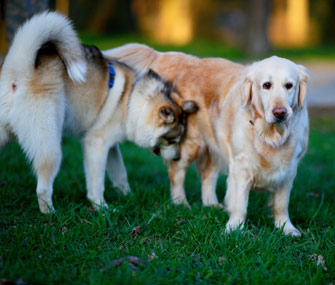Am I a Bad Pet Owner If My Dog Doesn’t Play With Other Dogs?
Published on February 20, 2015
Skip To

Dogs are, of course, our best friends, but are they each other’s best friends? Not necessarily.
Introvert or Extrovert?
Like people, dog breeds and individual dogs have different
personalities or temperaments. Often, it’s because they’ve been bred to do
certain things or behave a certain way.
Whatever the reason, a dog’s temperament can influence his willingness to play with other dogs.Breeds that were created to guard flocks or property may instinctively ward off predators or intruders — and that includes other dogs. Some of these canines can get along fine with other dogs if they have been raised with them, but they don’t necessarily want to play with them.
Scenthounds such as Beagles, Bassets or the various coonhound and foxhound breeds, on the other hand, usually work as a team to find and catch their prey. They’re often referred to as pack dogs, and they may be more inclined to like having canine company. In general, these are dogs who like to socialize with their doggie friends.
And some dogs — American Pit Bull Terriers, Golden Retrievers and Cavalier King Charles Spaniels immediately come to mind — are so focused on their people that they don’t always have a lot of interest in other dogs. This doesn’t always mean they don’t like the other dogs, but if it’s a choice between playing with a dog and playing with a person, chances are these pooches are going to choose the person.
Dog Parks: Yea or Nay?
We tend to have a romantic vision of dog parks as places where dogs can go to have the classic canine play experience that we have in our heads from books and movies. But does that mean you need to take your pooch to the dog park? In reality, a dog park is as much a jungle as any schoolyard playground, with a full range of the doggie equivalents of bullies, shy kids, cool kids and average Joes.Not every dog is suited to dog park visits (some should go only if they have the place to themselves), and you should take your dog’s breed and personality into account before taking him to one. If his breed standard describes him as “reserved,” “protective” or “suspicious,” or if he just doesn’t seem to enjoy playing with other dogs, he might be a better candidate for solitary walks or activities such as nose work, rally or tracking that don’t involve interacting with other dogs.
But none of this means that your puppy of whatever breed can’t benefit from early and frequent socialization with other dogs. He surely can! The more dogs (and cats and horses and people) your pup meets, the better equipped he’ll be to recognize which animals and situations are threatening and which aren’t — and to react accordingly.
Though socialization is important, inherited temperament can also be a factor. If you are purchasing a puppy from a breeder, meet at least one of the parents to make sure he or she isn’t fearful, shy or aggressive, as these traits could be passed on to your pup. And if a dog who is friendly toward other dogs is important to you, tell the breeder. She can help you choose just the right puppy from a litter or even point you toward another breed that would be a better choice.
And then you can arrange the right kind of play dates for your pup.
More From Vetstreet:

